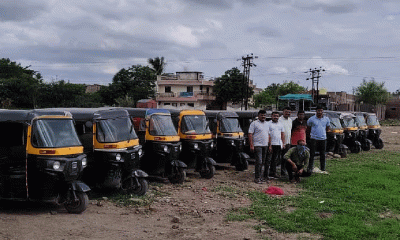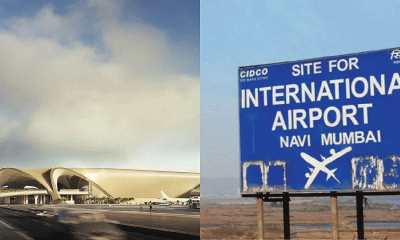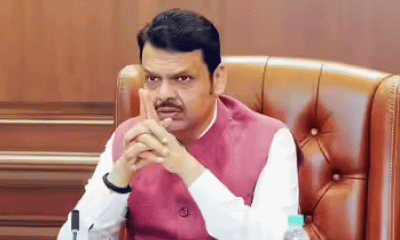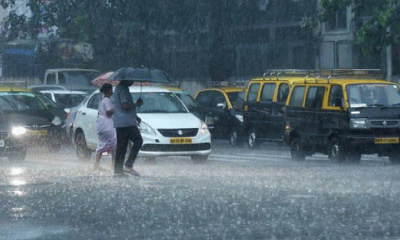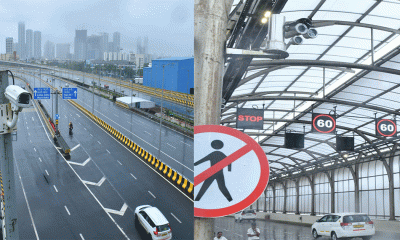National
UP: CCTV Footage Shows Drunk Rail Staffer Busy On Video Call, Places Bag On MEMU Throttle Causing Collision At Mathura Platform; 5 Suspended
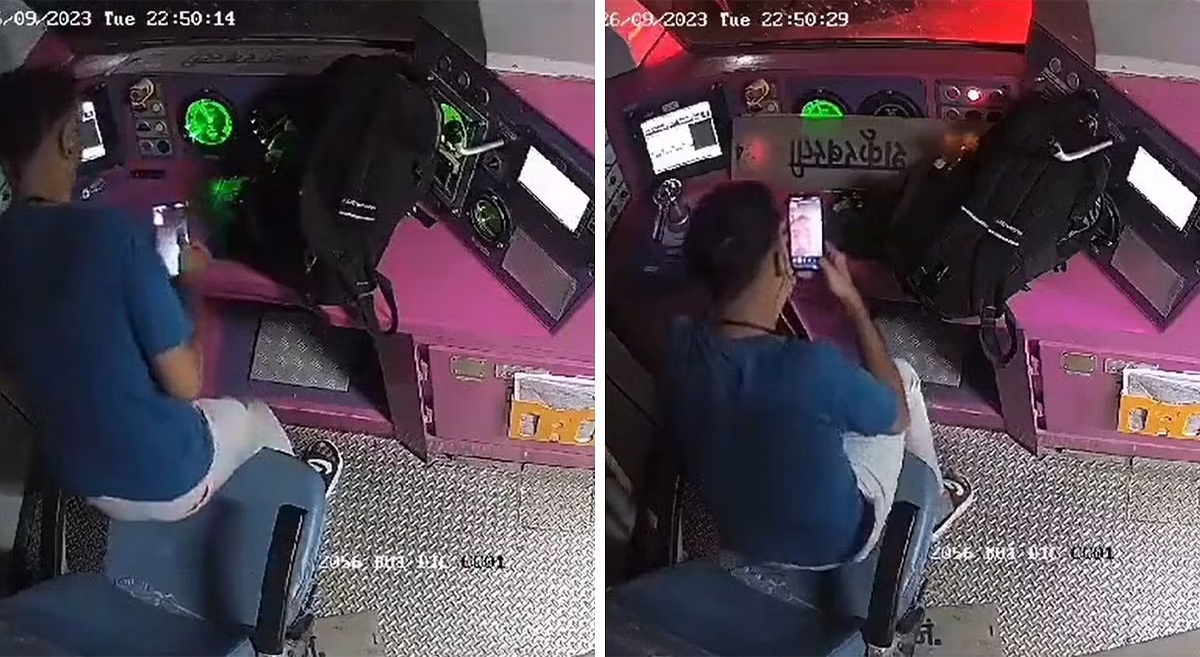
UP: A joint report in the Tuesday Mathura train incident, in which an electric multiple unit (EMU) train broke the buffer dead end and entered platform number 2, has found that the staffer was watching his mobile phone while handling the train and was mildly drunk, sources have said.
The report, according to the sources, while narrating the prima facie reason of the incident, said that according to the Crew Voice & Video Recording System (CVVRS), after the train arrived at the platform, a staffer named Sachin entered the DTC cab (engine) while watching his mobile phone.
It said that while carelessly putting his bag on the throttle of the engine, he again got busy on his mobile.
Drunk Employee Puts Bag On Train’s Throttle
The throttle, due to the pressure of the bag, went into forward position and let the EMU move towards the platform. “It broke the dead end of the platform and half of the coach climbed onto the elevated portion of platform number 2, leading to breakdown of OHE (overhead wire).” The report also said that a breathalyzer test conducted on Sachin showed a reading of 47 mg/100 ml which is considered to be mildly drunk.
“He has been sent for a medical test in which his blood sample will be taken to find out the exact level of alcohol consumption,” a source from the Agra Railway Division, said.
Divisional Railway Manager Tej Prakash Agrawal has suspended five persons including Sachin in connection with the incident. Of the other four, Harbhajan Singh, Brajesh Kumar, and Kuljeet are technical staff and Govid Hari Sharma is a loco pilot.
“We have suspended five persons and further detailed investigation is on,” Agarwal said.
In one of its observations, the joint report said that generally technicians receive the DTC cab (engine) key, however, in this case, the technician sent Sachin to receive the key.
Details On The Incident
Giving the brief history of the incident, the report said that the train arrived at Mathura station at 10.49 pm. After the loco pilot got relieved from his duty and came out of the cab, Sachin entered the cab to take the keys. Within a minute of his entering the cab, it started moving, broke the dead end and half of its portion climbed onto the platform.
Sachin in a written statement said that as per the instruction of his duty in-charge, he asked for the key of the cab from the loco pilot who told him that it was inside the cab.
According to his statement, when he entered the cab and put his bag inside there, the train started moving on its own. He said that he got scared and by the time he applied the emergency brake, it had entered the platform.
He said that he informed his in-charge about it and when he tried to find out the reason why the train started moving, he found that the throttle was in forward position and key was also in position.
Blame Game Over Collision
In his statement, he blamed the loco pilot for keeping the train functions in “switched on” position. However, the loco pilot in his statement said that he had handed over the key to Sachin before the latter entered the cab.
The joint report has mentioned Sachin as ETL staff whereas in his statement, Sachin has mentioned his designation as helper.
The EMU starts from Delhi and covers various local stations before terminating in Mathura. The platform number 2 starts from the train’s terminating point where a buffer dead end has been created.
Crime
ED books 29 celebrities for endorsing betting apps
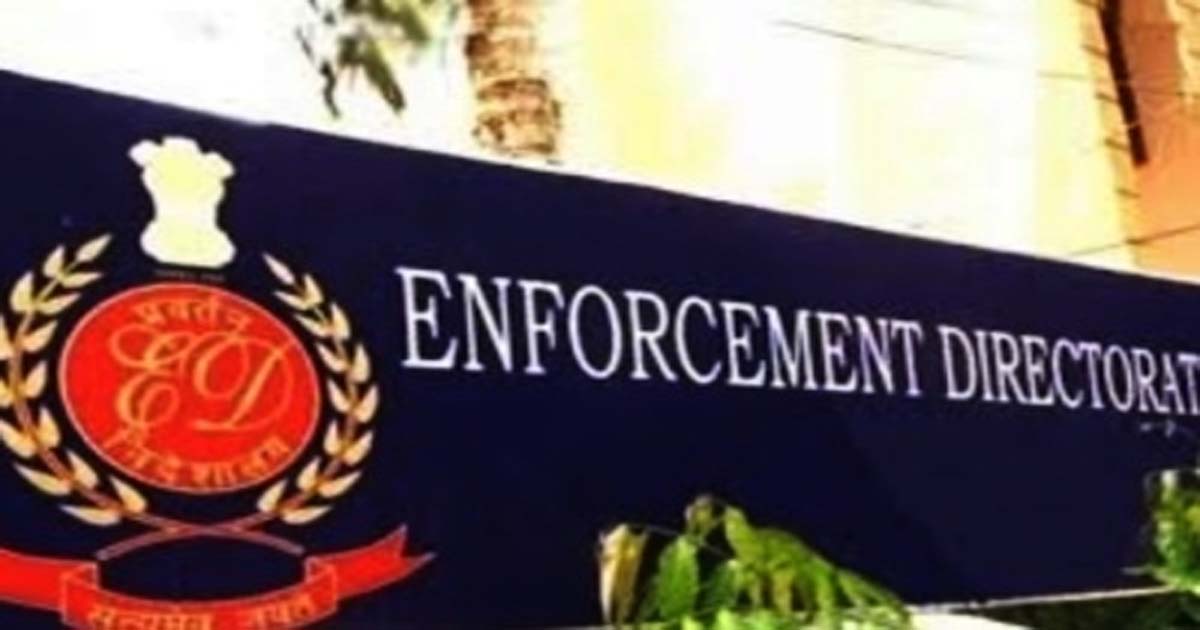
Hyderabad, July 10: The Enforcement Directorate has booked 29 celebrities in Telugu states for endorsing betting apps.
The central agency has filed an ECIR against 29 actors, influencers, and YouTubers for allegedly promoting illegal betting platforms, in violation of the Public Gambling Act, 1867.
The probe, under the Prevention of Money Laundering Act, has been taken up based on five FIRs filed in Telangana and Andhra Pradesh.
Film actors Vijay Deverakonda, Rana Daggubati, Prakash Raj, Nidhi Agarwal, Pranitha Subhash and Manchu Lakshmi, and Ananya Nagella are among those who have been booked by the ED.
The names of TV actors, TV hosts and social media influencers like Sreemukhi, Shyamala, and Varshini Sounderajan, Vasanthi Krishnan, Shoba Shetty, Amrutha Chowdary, Nayani Pavani, Neha Pathan, Pandu, Padhmavathi, Harsha Sai and Bayya Sunny Yadav also figure in the list.
Most of these celebrities were earlier booked by the Hyderabad and Cyberabad Police. FIRs were registered against them at Panjagutta, Miyapur, Cyberabad, Suryapet, and Visakhapatnam police stations.
The ED suspects endorsements of platforms like Junglee Rummy, A23, JeetWin, Parimatch, Lotus365, and others involved laundering of large sums through paid promotions.
The ECIR has been booked under BNS sections 318 (4), 112 r/w 49, Telangana Gaming Act sections 3, 3 (A), 4, IT Act 2000 and 2008 section 66D.
In March, Vijay Deverakonda, Rana Daggubati, Prakash Raj and others were booked by Cyberabad police for allegedly promoting betting apps. They, however, clarified that they are not promoting any illegal app.
While Rana Daggubati and Vijay Devarakonda stated that they endorsed only legally permitted online skill-based games, Prakash Raj said he did not renew a contract to promote an app in 2017 after realising that he should not have done it.
A case against six actors and 19 social media influencers was registered at the Miyapur Police Station of Cyberabad Commissionerate in March.
The police registered the case on a complaint by one Phanidra Sharma, a resident of Miyapur, who stated that he found several celebrities and social media influencers actively promoting illegal betting apps, websites and other platforms. The complainant said promotion of betting apps was causing harm to individuals and society by encouraging this addictive, short-term, risky money-making behaviour, leading to financial distress.
Crime
2002 import-export fraud case: CBI takes custody of Monika Kapoor in US
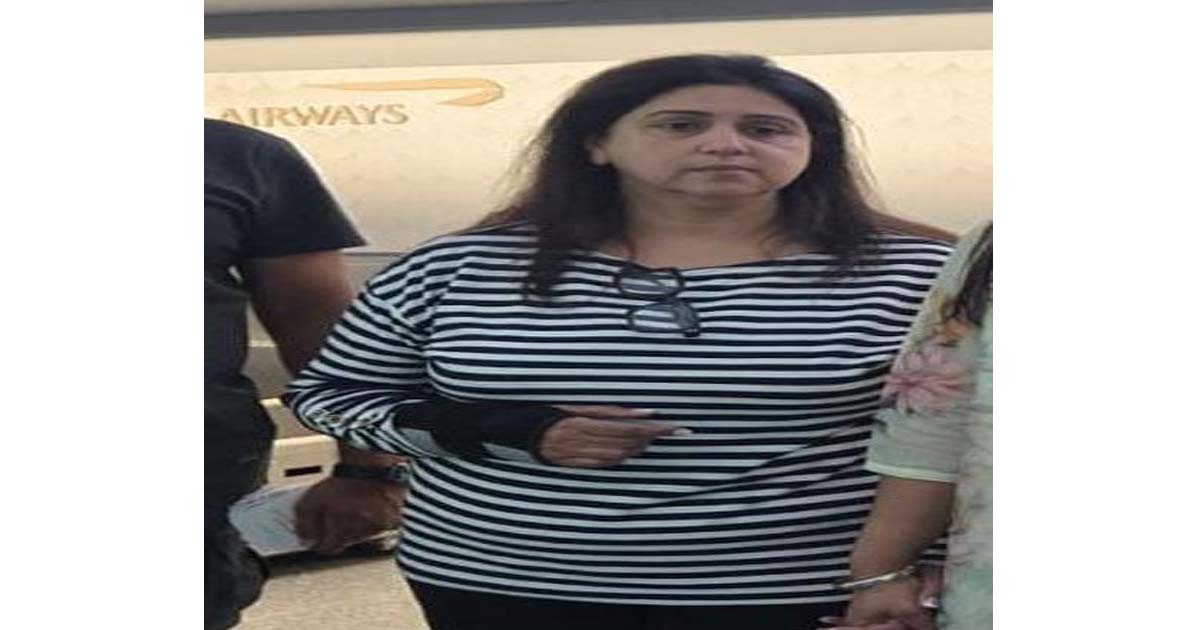
New Delhi, July 9: The Central Bureau of Investigation (CBI) has taken the custody of Monika Kapoor, an alleged economic offender, in the US and will bring her back to India, ending an over two-decade-long run from the law, officials said on Wednesday.
The development comes after Kapoor’s extradition from the US.
The CBI in a press release said the chase has ended after two decades “with the successful extradition of Fugitive Ms. Monika Kapoor, who is accused in a 2002 Import-Export fraud and was on run since then, from USA.”
According to the information provided by the Central agency, fugitive Monika Kapoor, Prop. of M/s Monika Overseas in conspiracy with her brothers, namely Rajan Khanna and Rajiv Khanna forged export documents viz. Shipping Bills, Invoices and Bank Certificates of Export and Realisation during the year 1998.
She obtained six Replenishment (Rep.) Licenses for the import of duty-free gold worth Rs 2.36 crore.
“In furtherance of the criminal conspiracy, they sold the said Rep. Licenses to M/s Deep Exports, Ahmedabad, on premium. M/s Deep Exports, Ahmedabad utilised the said licenses and imported duty-free gold, which caused a loss to the Government Exchequer to the extent of Rs 1.44 crore during the year 1998,” the press release mentioned.
The CBI, on the completion of the investigation, filed a charge sheet on March 31, 2004, against Monika Kapoor, Rajan Khanna, and Rajeev Khanna under sections 120-B r/w 420, 467, 468 and 471 of the IPC.
The Chief Metropolitan Magistrate, District Court Saket, New Delhi, vide order dated December 20, 2017, had convicted Rajan Khanna and Rajeev Khanna.
The CBI said the accused, Monika Kapoor, did not join the investigation and trial; she was declared a proclaimed offender by the trial court on February 13, 2006. The Ld. Trial Court had issued an open non-bailable warrant of arrest on April 26, 2010, and a Red Corner Notice was also issued against her.
A request for extradition was sent by the CBI on October 19, 2010, to the US authorities. Following intense coordination with authorities in the US, a CBI team travelled to the country to take custody of the fugitive.
This extradition marks a major breakthrough in the pursuit of justice and reiterates CBI’s commitment to bringing fugitives to face the law in India, irrespective of international boundaries.
The CBI team is returning to India with the fugitive. Monika Kapoor is being produced before the concerned court and will now face the trial.
The press release said that the CBI remains steadfast in its mission to combat economic crimes and will continue to pursue all legal avenues to ensure that the fugitives are brought to justice.
National
Congress backs PM Modi’s BRICS stand, vows firm fight against terrorism
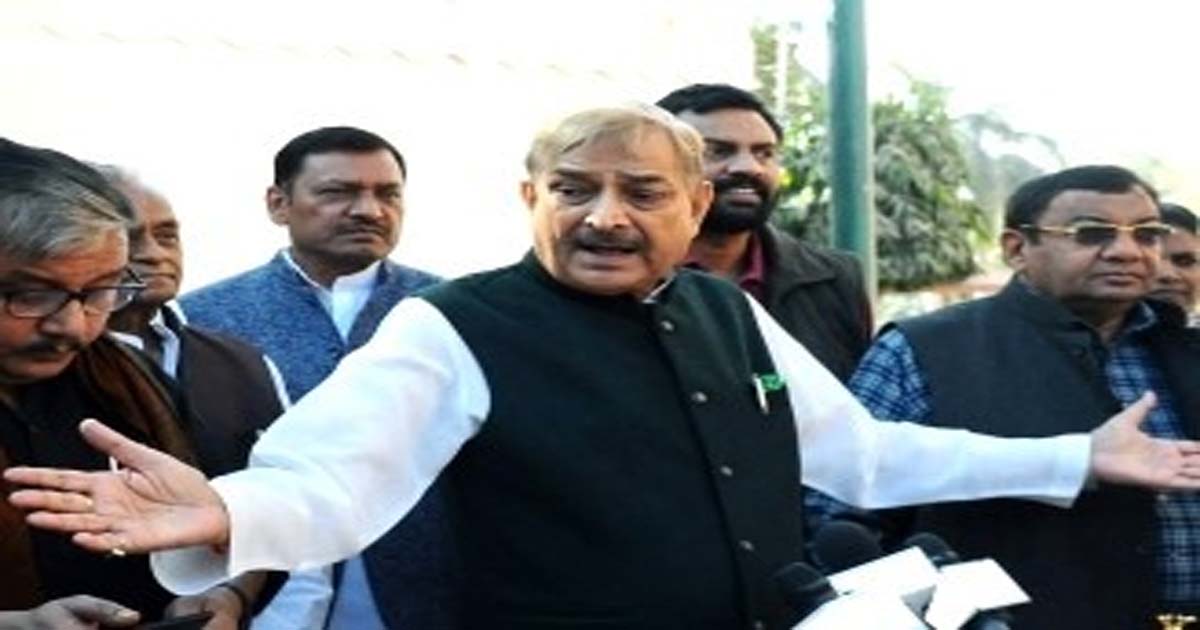
New Delhi, July 7: Backing Prime Minister Narendra Modi’s firm stance on terrorism at the BRICS Summit, senior Congress leader and Rajya Sabha MP Pramod Tiwari on Monday expressed his complete faith that India will fight terrorism with full resolve and determination.
His remarks came in response to PM Modi’s statement at the global summit, where he called terrorism “the most serious challenge facing humanity” and emphasised that condemning terrorism must be a matter of principle, not convenience.
Speaking to Media, Pramod Tiwari supported the Prime Minister, stating, “At the BRICS Summit, voices should have been more vocal against terrorism. The platform should also raise social, economic, and global concerns of its member nations. India has consistently spoken for global peace and justice.
“I have full faith that our country will fight terrorism with unwavering determination. I wish those responsible for the recent attack in Pahalgam had been caught — it would have revealed who trained and supported them. Such information is crucial and would have commanded greater respect globally.”
Tiwari also took a swipe at US President Donald Trump, who recently lashed out at the BRICS alliance and warned of an “additional 10 per cent tariff” on countries aligning with what he termed “anti-American policies.”
“BRICS is for protecting nations who are in it. President Trump had previously issued similar warnings during his visit to India. At that time, Prime Minister Modi should not have laughed or responded lightly. He should have stood firm and reminded Trump that BRICS works on its own principles and is committed to its founding objectives,” said Tiwari.
The Congress leader criticised the ongoing Special Intensive Revision (SIR) of electoral rolls in Bihar.
On Sunday, Chief Election Commissioner Gyanesh Kumar stated that extensive consultations had been held with political parties and acknowledged that “no one was satisfied” with the current status of the electoral rolls.
Reacting to the development, Tiwari said, “We are not satisfied with the Election Commission of India’s response. The documents required for voter list revision are unnecessarily complicated and impractical. If the process is designed to make it difficult for traditional voters who are against the BJP, Scheduled Castes, Backward Classes, and minority voters, to remain on the rolls, then this raises serious questions about the Election Commission’s intent. If the ECI wants to remove them.”
He added that while some groups have approached the Supreme Court, others are considering forming “people’s courts” to ensure fairness.
“The Congress has always upheld the voter’s right to participate in democracy. We will continue to stand by that principle and ensure that all necessary documentation is provided,” he asserted.
Tiwari also took aim at the National Democratic Alliance (NDA) in Bihar, particularly targeting Lok Janshakti Party (Ram Vilas) leader Chirag Paswan.
During a political rally in Saran district on Sunday, Chirag announced that he would contest the upcoming Bihar Assembly elections and urged his party workers to prepare for all 243 constituencies in alliance with the BJP and JD(U).
Mocking the move, Tiwari remarked, “The NDA in Bihar is a sinking ship. Chirag Paswan, despite being the son of a respected leader like Ram Vilas Paswan, is trying to stay afloat in turbulent political waters. If he’s contesting all 243 seats, it means internal cracks have widened and many alliance members are already looking for the exit door ahead of elections.”
He continued, “It’s clear that NDA leaders are aware they are going to lose many seats. Their desperation is evident. While they are forming the central government, they are losing their grip on the state. This creates confusion among their own allies.”
In the 2020 Bihar Assembly elections, Chirag Paswan’s LJP had contested 137 seats but managed to win only one, Matihani. Despite this, Chirag currently holds a Lok Sabha seat and serves as a Cabinet Minister in the BJP-led central government, which includes JD(U) and Telugu Desam Party (TDP) as key allies.
-

 Crime3 years ago
Crime3 years agoClass 10 student jumps to death in Jaipur
-

 Maharashtra10 months ago
Maharashtra10 months agoMumbai Local Train Update: Central Railway’s New Timetable Comes Into Effect; Check Full List Of Revised Timings & Stations
-

 Maharashtra10 months ago
Maharashtra10 months agoMumbai To Go Toll-Free Tonight! Maharashtra Govt Announces Complete Toll Waiver For Light Motor Vehicles At All 5 Entry Points Of City
-

 Maharashtra10 months ago
Maharashtra10 months agoFalse photo of Imtiaz Jaleel’s rally, exposing the fooling conspiracy
-

 Crime10 months ago
Crime10 months agoBaba Siddique Murder: Mumbai Police Unable To Get Lawrence Bishnoi Custody Due To Home Ministry Order, Says Report
-

 National News10 months ago
National News10 months agoMinistry of Railways rolls out Special Drive 4.0 with focus on digitisation, cleanliness, inclusiveness and grievance redressal
-

 Maharashtra9 months ago
Maharashtra9 months agoMaharashtra Elections 2024: Mumbai Metro & BEST Services Extended Till Midnight On Voting Day
-

 National News10 months ago
National News10 months agoJ&K: 4 Jawans Killed, 28 Injured After Bus Carrying BSF Personnel For Poll Duty Falls Into Gorge In Budgam; Terrifying Visuals Surface



